With profound apologies to Petula Clark,
And you want to make a bet
You can always go — downtown.
When you've got money
And bookies take bets on games
Seems to help, I know, downtown.
Just listen to the music of the traffic in the city
Don't linger on the sidewalk where the neon signs are pretty —
How can you lose?
Step into the Central and
Forget all your troubles, forget all your cares and go
Downtown, things'll be great when you're
Downtown, no finer place for sure,
Downtown, everything's waiting for you.
Downtown wasn't the only thing that Urban Renewal of the 1960s & 1970s killed — it killed all of the old domino parlors, pool halls, and bookie haunts which didn't discriminate as to economic status and the best of them were all — downtown.
In this, my focus is on one of them — the Central Club — although several others will be mentioned. I've chosen it because it is the only one that I have even a taste of first hand knowledge, naive and innocent though that taste was at the time. Before the 1967 Oklahoma County Office Building, and, more to the point, before the Metro Parking Garage at Robert S. Kerr & Hudson was built ...
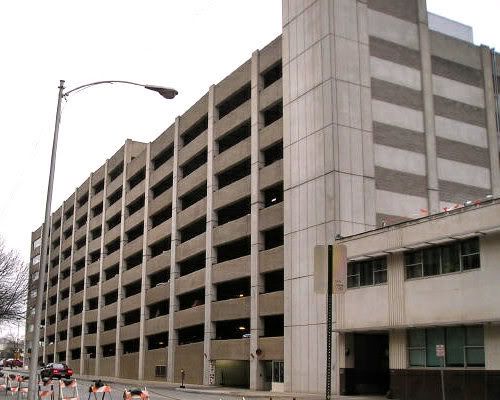
On the same spot as that parking garage (though not as wide) was a much earlier and venerable public entertainment facility — domino, pool, and, yes, a betting facility. An October 19, 1950, ad announced its new opening ...
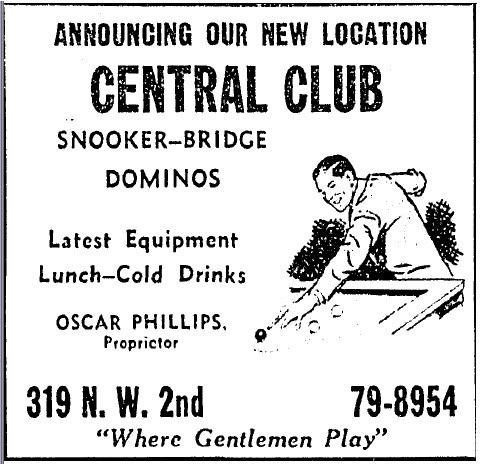
For those who think that downtown vice was a part of the city's lore which passed silently in the night with the passing of Big Anne's and the Southern Club around the turn of the last century, well, think again.
At least by the 1940s, possibly during the 1930s or earlier, downtown Oklahoma City was the hub of bookie gambling which endured until all the old pool halls and domino parlors were torn down during the Urban Renewal era. If not chief among them, certainly the Central Club was the first among equals.
In its last location, 319 Robert S. Kerr (N.W. 2nd Street), it would have been located in the highlighted area shown in the Sanborn Map updated to 1955 shown below:
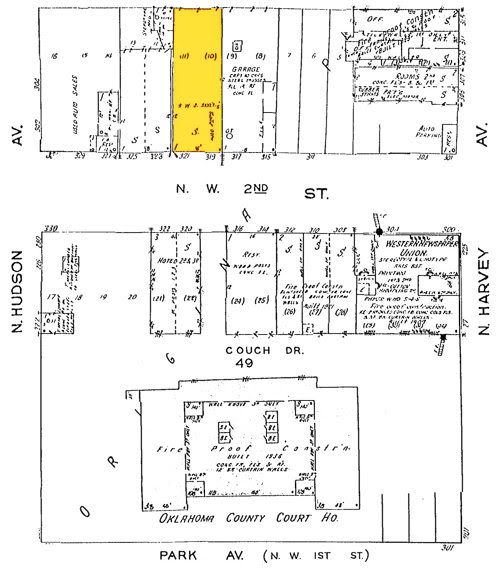
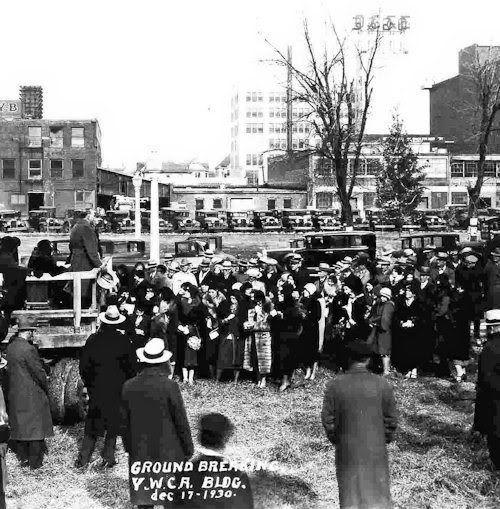
The view in the above picture looks north from Park Avenue over where the County Courthouse would be built six years later and northeasterly toward the OG&E Building at Dean A. McGee (N.W. 3rd Street) and Harvey. It's hard to tell the exact placement of the low level buildings in the foreground but they may be the row of buildings on N.W. 2nd or they may be the backside of buildings on the north side of Couch Drive.
In any event, the single-story parking garage that came to house the Central Club would have looked something like one of the buildings in the middle — nothing fancy, just something old and musty. A very excellent article in the May 9, 1976, Sunday Oklahoman's Orbit insert said,
The Central Club was Vestal's last old rival. It was located across the street north of the County Courthouse. With its dusty deer heads and blackboard baseball scoreboard, it made the transition to parking lot about five years ago.The article was mainly about the Herman Vestal's Place at 225 W. Sheridan, and I'll say more about Vestal's at the end of this article.
My own acquaintance with the Central Club was when I was a law school student at the University of Oklahoma, more particularly during 1966-1968 when I clerked at an Oklahoma City firm located at the northwest corner of Hudson and Dean A. McGee. When trekking to the County Courthouse to file papers or what-not, I would pass near the Central Club, and, on occasion, went there for lunch. All that I recall with certainty is that it was a beat-up nothing fancy place with lots of smoke, domino and pool tables, and a lot of old guys hanging around shuffling dominoes. But, there were guys in shiny shoes and suits, too. I had no notion of its other and more interesting bookmaking function that I'm about to describe. I was just a naive young pup at the time.
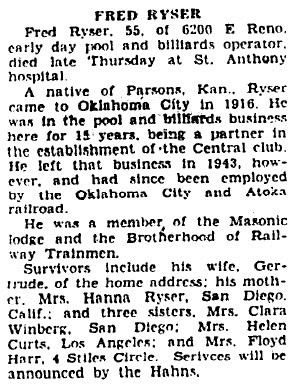 But, first, a little history. The Central Club's origins apparently date back to around 1928, if I've done my math correctly based upon the June 15, 1945, obituary of Fred Ryser shown here. He apparently co-founded the Central Club around 1928.
But, first, a little history. The Central Club's origins apparently date back to around 1928, if I've done my math correctly based upon the June 15, 1945, obituary of Fred Ryser shown here. He apparently co-founded the Central Club around 1928. I'm sure that I've not tracked down all its locations before winding up at its last, but here are a couple of others:
According to this July 3, 1947, article, it was located in the first floor of the Scott-Thompson Building at 134 N.W. 2nd Street until late June 1947. The article describes a fire which destroyed the building on July 2 and threatened the Petroleum Building, its next-door neighbor.
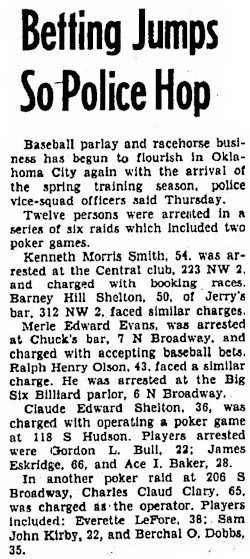 By the time of this March 25, 1949, article, the club was located at 223 N.W. 2nd Street, which would place it in the western part of the block where the Bank of Oklahoma Tower is today, perhaps at the location of the Plaza Parking garage.
By the time of this March 25, 1949, article, the club was located at 223 N.W. 2nd Street, which would place it in the western part of the block where the Bank of Oklahoma Tower is today, perhaps at the location of the Plaza Parking garage.It was doubtless at one or both of the above 1940s locations that Pody Poe began hanging out as a teenager, as described in a fascinating January 23, 2005, Oklahoman article by my good friend, ace Oklahoman reporter and Okc historian Steve Lackmeyer. A small part of that article is shown below, as is a photo of Minnesota Fats, who was at the Central Club sometime in the 1940s:
Apparently such a coin-flip was the beginning of gambler Poe's career.Pody Poe’s Colorful Life
● Nov. 29, 1932: Tracy Coy “Pody” Poe is born.
● 1934: Poe makes his first front page headline when he falls out of his family’s car while the vehicle was going 65 mph.
● 1935-1937: Poe’s father, Coy Poe, leaves Oklahoma City for Los Angeles, where he composes music and helps produce five movies. Pody Poe goes to school with John Drew Barrymore Jr. — the father of actress Drew Barrymore.
● 1940s: Pody Poe’s parents divorce, and he travels between his father in California and relatives in Oklahoma. As a teen, Poe begins to hang out at the Central Club, an Oklahoma City pool hall, where he watched pros, including “Minnesota Fats.” Poe begins his lifelong love of golf at Edgemere Golf Club. It’s there he meets some gamblers. They flip a coin to see who pays for lunch.
Articles such as the above March 25, 1949, article appeared frequently in the time span of the late 1940s to late 1960s. See this July 22, 1955, article, for example. Others are noted below in the OCPD campaigns against the bookies.
As best as I could determine, neither the Central Club nor its owners or operators were ever charged with an offense — it was merely the business home of many of the city's bookies albeit with the consent and knowledge of the proprietors.
And it wasn't a best-kept secret. The bookies' apparatus — tickers and chalkboards — were apparently on display for all to see.
In something of a muckraking article, the Oklahoman's August 27, 1955, headline read as follows:

You can read the entire article here but excerpts are as follows:
At least six bookie gambling establishments are operating openly in Oklahoma City with little or no police interference. ¶ The establishments also feature poker and domino games in which you can bet anything your purse will stand. ¶ Newsmen were able to place bets in or photograph gambling activities in the six places Thursday and Friday.Despite occasional crackdowns, like that shown in this April 12, 1956, article and this one in a November 6, 1958, article, and this one in an October 6, 1961, article, it would apparently take the Pei Plan and Urban Renewal to rid downtown of the overt and blatant gambling going on right here in downtown Oklahoma City. Urban renewal, and not the police, made places like the Central Club just another memory of the downtown that was and is no more.
They included Jerry's Recreation Parlor, 314 NW 2; Central club, 319 NW 2; "21" club at 21 S Broadway; Palace Recreation club at 310 N. Broadway; Sportsman's Bar, NW 5 and Broadway, and the 24th Street Billiard Parlor at SW 24 and Robinson.
* * *
When informed of our findings, Roy Bergman, chief of police, said he was aware of the booking activities in Oklahoma City. ¶"There is not much we can do to stop them," Bergman said. "We try to harass them as much as possible. We try to check them every day and if a known bookie is around we arrest him and fine him $20, the maximum under our city ordinances."
* * *
In each of the bookie establishments reports found ticker tape machines which furnished gamblers and bookies with inning-by-inning developments in four baseball leagues. ¶ Beside the "tickers" were blackboards on which were posted results and pertinent information for gamblers about each game.
* * *
In only one establishment was a news photographer challenged with his camera. ¶ That was in Jerry's Recreation Parlor. A porter spotted the camera and notified the bookie. The photographer was immediately surrounded by angry employees of the club. When he complained, a bartender told him, "We got to be careful. You know these d---- reporters are always trying to cause trouble. We got that board in here and a lot of prominent people hang around. They don't want their pictures taken."
This brings me to the end of the story and I'll get back to where I said I would go in the beginning: Herman Vestal's Place. In an long urban renewal nostalgia article, the May 9, 1976, Oklahoman almost lamented the passing of the era which had room for places like the Central Club and Herman Vestal's place, and it's an article that is well worth the read. To read the full two and one-third page article in one piece, click here but you might find it easier to read one page at a time: click here for the 1st page, click here for the second, and here for the third. Here are a few excerpts:
Where Will All the Winos Go?Ain't it just like the newsmen — whack on the police for not enforcing gambling laws on one hand when it suits 'em, and later wax poetic when that era comes to an end!
It never made the Diners Club list of Five Star restaurants. ¶ The chamber of commerce never recommended it as one of the must sites to visit in beautiful downtown Oklahoma City. ¶ It was a place called simply Herman Vestal's Place at 225 W Sheridan, and a lot of guys like PeeWee and Ernie and Shorty are sure gonna miss not having it around.
* * *
In name, Herman Vestal's was a combination pool hall, domino parlor, bar and greasy-spoon beanery where 45 cents could get you a game of moon and an hour's worth of cigar smoke and tobacco spit, and where twice that amount would buy a bowl of chili potent enough to startle your stomach and sour your breath.
In retrospect, Vestal's was the downtown's last genuine hangout for a cast of colorful characters — winos, moochers, bookmakers, transients, old men who had nothing to do and young men (including at least one erstwhile journalist) who darn well should have been doing something else.
Go figure! They, like me, just probably wanted to tell a good story.
Hope you had a good time down on this a-bit-different-downtown-Oklahoma City-underbelly memory lane.














10 comments:
Hi, my name is Chris Vestal and I am Herman's Great grandson. Thanks for posting the article from 1976. It was great learning more about my families history.
I have also been told Herman also owned several other restaurants and bars. Do you have any reference matarial that might help me find some more info. Thanks
Thanks, Christopher. I don't know of other places that Herman may have owned but I'll look in the Oklahoman archives to see if I locate anything. If I do, I'll post another comment here.
Christopher, I looked through the Oklahoman's archives and find no mention of any other business property owned by your great grandfather. Of course, that means nothing other than no Oklahoman article made mention of it.
I did see that I inadvertently failed to include a piece of the original article on a 3rd page of the Orbit Magazine which carried the story, and that has now been added in the above.
Last, I found a 1948 story about your great grandfather (I'm assuming that he's the same "Herman Vestal") unrelated to his businesses but which was kind of interesting. His stolen camping gear had been recovered by a sheriff's deputy and there is a photo - not a good one, but I thought you'd like to have it. I've stuck in the same Photobucket directory as the other files, at this location.
Thanks! I shared that article with my grandpa and he remembers when that happend but didn't know that it had made the paper.
Chris
You're welcome, Chris. Sorry that I couldn't find more.
Thanks's again from what my family tells me herman vestal had a half brother that had a place named Elmo's cafe in the 50's His name was Elmo Burris or Elmo Burres. not sure on the spelling.
I used to go to the Central Club with friends to eat lunch and get in a game or two. I remember eating Spaghetti Red. Was skeptical about eating that rather unappetizing looking plate of food but; to my surprise it was quite good. Would watch the seemingly never ending Golf game (played on snooker table) with amazement as to the skill of those players. Two that I remember were P. Moon and a lawyer named Jess, last name escapes me right now. Were usually 4 or 5 players in the game. When a player sold out, the others in the game would give him a tongue lashing that would make weaker men run home to mommy. Also spent time at Jerry's across the steet as well as the Empire Club.
oulefty
I just saw your comment, Bill, and thanks for it. Add any other stories you care to!
really enjoyed that walk down memory lane. I hung out at the Empire and the Central club while a high school student in 1966. Some of the best 1 pocket players in the world haunted the Central club for decades. Pody Poe was my dear friend for the last 25 years of his life.
He and the late Mark Baron and I shared a love of Formula 1 racing and traveled to several races in Montreal. As a musician in OKC during the 70's thru the 90's Pody's was the greatest place in the world to hang out in the wee wee hours after work.
Post a Comment